Justine Trubey recently returned to the States from southeast Asia. If you’re interested in traveling off the well-worn tourist path and have questions about personal safety in places where you don’t speak the language or even read the alphabet — read on!
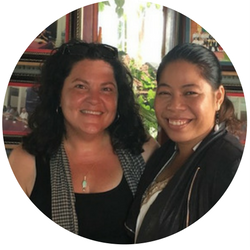
Justine with Rachna Satrei’s founder, Nhean Phoung Maly
I was 47 and I was totally burnt out after 4 years working at a startup. I realized that I’d done all of these things for myself around the betterment of my career and my family, but nothing towards the betterment of society.
As an executive in publishing, I spent a lot of time trying to get brilliant, educated, accomplished women to believe in themselves. I decided to take some time to see what women’s empowerment looks like in a different environment.
Looking for volunteer opportunities, I found Rachna Satrei, an NGO in Cambodia with a mission that matched mine exactly: Women’s empowerment through economic independence.
In Cambodia, a poem called the chbab srey (or “norms for women”) has taught for centuries that women must be subservient to men. This has been passed down from generation to generation. So the woman who founded Rachna Satrei is stepping outside of the norm.
During my time there, I raised a good deal of money for the organization. I worked 5 days a week, and usually went out at night. Compared to working at a startup, it felt like a part-time job!
After volunteering in Cambodia for 3 months, I visited friends in Europe. While there, I met a guy who rode his bike from Switzerland to Cambodia. He inspired me to want to experience a place that deeply. So I went back to southeast Asia and did a solo motorbike tour.
When I told my husband that I planned to do a solo motorbiking trip, he was terrified I would come home broken or in a box. But at the same time, he didn’t want to be the reason that I didn’t do it. So he’s glad I did it, but he’s also glad it’s over.
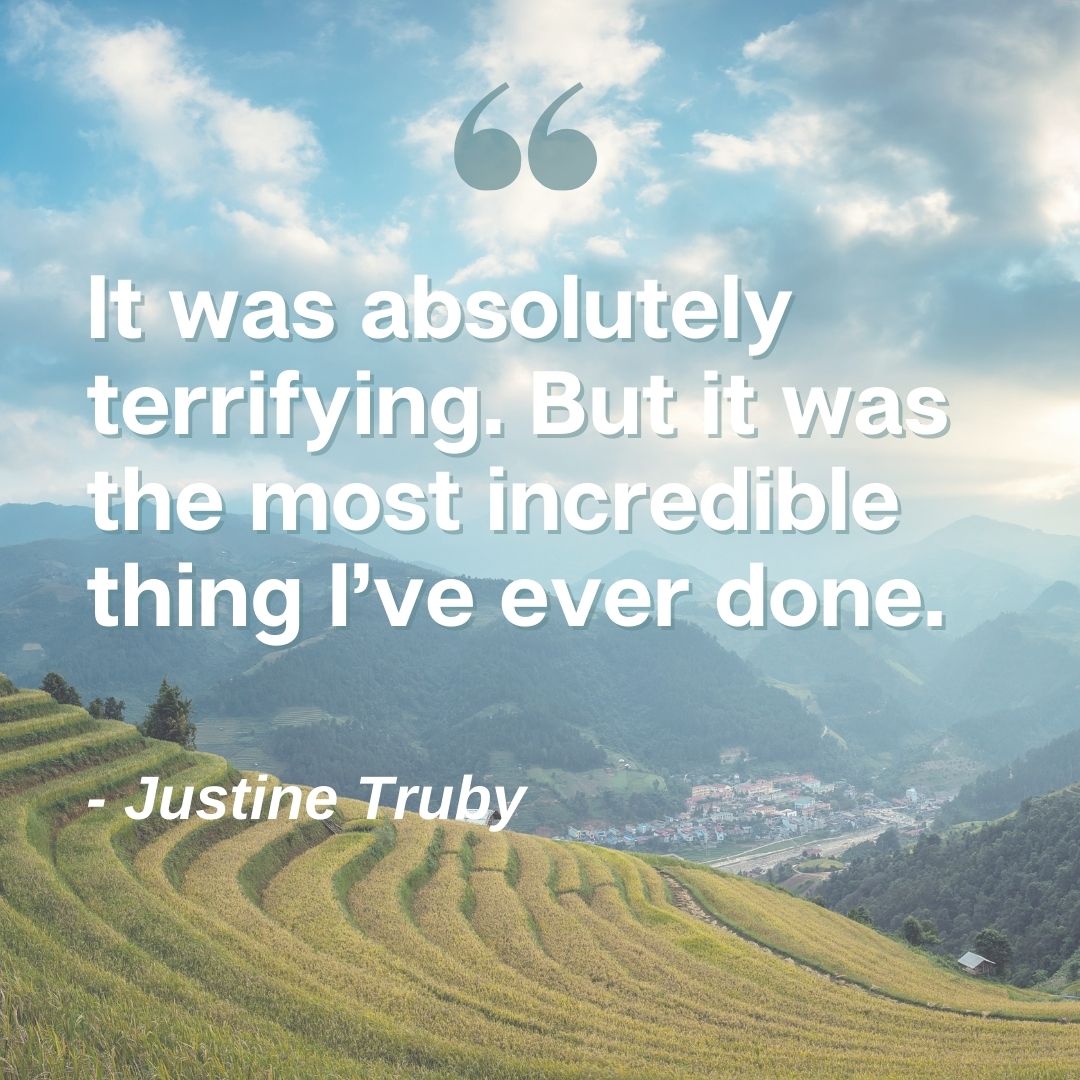
Instead of riding a 700-pound European bike like so many foreigners, I chose a Honda 150, which was small enough that I could pick it up on my own. Still, the motorcycle trip was scary all the time. It was absolutely terrifying — much more dangerous than I even let on to my husband. But it was the most incredible thing I’ve ever done. And I’m living a better life as a result of it. My friends notice that I’m different now; even my voice is different!
I did 2500 miles in 19 days. I was so scared all the time of dying so far from home, scared of getting flat tire or hitting a kid or a dog or a chicken. Mostly I was afraid that I would get knocked off my bike and really hurt and broken in a way that would keep me from living this amazing life that I realize that I have.
Was it easy to meet people?
I’m insanely social. I’m pretty gregarious and fearless when it comes to meeting people. But I didn’t meet a lot of people while I was on the road. It’s really hard to meet locals when you don’t speak the language, and there weren’t a lot of foreigners where I went. In my day-to-day life, I was craving that interaction I’d had back in New York: the inside jokes, the puns, the wise-cracking, the easy back and forth.
Every Aussie ever and half the europeans do this loop in southeast Asia or doing a year-long bike trip. When you’re on a motorcycle you’re part of that group. And we were really happy to meet each other when it happened, but we’re all kind of doing our own thing. And I was at least 20 years older than almost all of them!
So even though communicating with friends and family back home is simple now — thanks to WhatsApp, FaceTime, and all the other ways — I still went through periods of deep longing and loneliness.
At one point, I even got on Tinder to find friends!
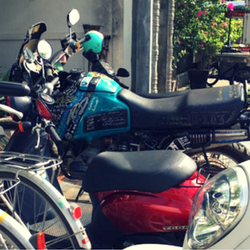 Did you ever feel unsafe as a woman alone?
Did you ever feel unsafe as a woman alone?
Overall I did not feel unsafe. My solo trip was scary not because I was a woman alone, but because I was going down steep hills where I was literally sliding off my seat, with traffic weaving around me, people walking into the road, buses turning, surrounded at times by tuk tuks and bicycles, the dirt and the gravel, a little kid who runs out in front of you, a noodle truck turning a corner suddenly.
The only time I felt super uncomfortable being a woman alone was in Bangladesh. I was meeting my friend Tom at the train station there. It’s a muslim country and I know I look like a foreigner from a million miles away. So I tried my best to dress appropriately. I had a scarf on my head and was covered in loose clothing. A man came over to me and asked why I was in the country. Pretty soon, there was a crowd of people, mostly men, asking me why I was in the country, surrounded by them felt insanely uncomfortable. After a while, another man came over and made them move away. That was the only time I ever felt uncomfortable.
What were some of the downsides?
Eating on the street, I’d often end up with this crazy food and not know how to pay for it. I felt overwhelmed all the time. I had a day where I hated everything that I’d loved the day before. I screwed up the traffic circle, with horns beeping all around me. I couldn’t get my noodles without the egg in it. I was overwhelmed by loneliness. I was pissed that I didn’t understand anything!
Fortunately, that feeling didn’t last more than I day for me. I learned to say to myself, “Okay. Today sucks. Totally. So hopefully tomorrow will be better.”
And because Thailand is so affordable for a Westerner, on an especially crappy day, I could decide to eat a grilled cheese sandwich and a milkshake in an air-conditioned restaurant instead of eating my usual fly-covered pork on the street.
Even though I was wearing body armor, boots, and long pants, I burned myself on my motorcycle. The burn got terribly infected, so I went to a wound cleaning clinic in Thailand, which ironically was pretty dirty, not what you would expect a medical establishment to look like.
I was sick a lot of the time; I lost a lot of weight. I wore the same three pairs of underwear — inside/outside, wash and wear. I spent a lot of time hating myself for not being part of the negotiation society. I felt stupid bargaining over $3, which was not a lot of money to me. But I also felt not bad bargaining over it, when I was culturally required to do so.
At any other time in my life, I would have fought against making big cultural mistakes. But when you decide to go somewhere that’s really different, you have to appreciate what they’re doing and know your place in it. It’s not your place, so of course, you’re going to fuck up all the time.
What was your typical day like?
On the motorcycle trip, I’d ride all day, get off the road at around 4 p.m., then read, and shower. Then I’d find a restaurant or bar to hang out in that evening. Sometimes I’d meet with people, but mostly not. I’ve been married for over 20 years, so I’m used to collaborating. I sometimes wanted someone else to choose where to eat at night.
It wasn’t hard to find places to stay, find gasoline, or get fed. Every little town has a store with a stand with little Jack Daniels bottles filled with liquid; that’s their gas station!
Generally, I smoked too much and drank too much. But really during the road trip I could do what I wanted. If I wanted to stay up until 1 a.m. dancing in a reggae bar at 105 degrees, I could do it. I had nowhere else to be. No one needed me; no one wanted to find me. It was spectacular fun to have that for several months.
What was the food like?
Thai food is the best! It’s much, much, much better than Cambodian food. I love to eat on the street, and I will pretty much eat anything, try anything unless I already know I don’t care for it, like stuffed frogs. So much Asian food is take-away. People often don’t have a kitchen, more like a shed in the back with a gas burner and charcoal.
Every time I went to the market in Cambodia I’d swear I’d never eat again. The smells! The flies! On the other hand, it was important to see where your food comes from: That is a pig; this is what that person has done to it; this is the meat that results from what that person has done to the pig. Americans are good at ignoring where their food comes from. But it feels more honest to me to see that stuff up close. It’s just not always that appetizing.
There’s a lot of ritual around food. Everyone has a house that has a little box in front of their house, so you know they’re serving something. They take some broth and noodles and put it in a bowl with vegetables and pork balls and some sauce. It’s two ladies who made this stuff in their backyard.
Even in Buddhist countries, when you try to order something vegetarian you’ll sometimes see a fish eye floating in your broth. But what do you do when your boss gives you a special treat of lung and heart meat skewers? And what do you do when your tuk-tuk driver takes you home to meet his mother, and they have no money, and they serve you something. Do you eat it? Of course, you do! To refuse it would be a huge insult.
What’s next for you?
I had plans to travel to South America, but a friend in L.A. offered me a job opportunity with a huge social mission that was too good to pass up. So I came back to the States to start that job. I’ll be in Los Angeles for the next year; my husband plans to be here at least half of the time.
This is the fourth time my husband and I have lived apart. But we’ve been married for 22 years and we have a commitment in the traditional sense. It’s the most fantastic thing to do your own thing and then come back together refreshed and happy.
What did you learn?
I learned an enormous amount this year. During the trip, I realized the stupid good fortune that I have as an American, and second a white American. I have a greater appreciation for the agency and choices I am able to make as a result of where and how I was born.
This was also a chance to be anything that you want to be. For instance, I’m a planner, so I got to experiment with what happens when I don’t make plans. What happens when I’m just planning the night beforehand? I’d figure out where I wanted to go next, and how many days I wanted to stay. I really challenged myself to go where my feet led me. I learned that it often costs more money that way.
Justine’s advice for women considering going to southeast Asia
Embrace the extraordinary awkwardness at every moment! I think you’re going to have a less stressful time once you drop the expectation that you’re going to understand anything that’s ever happening.
When my mom was visiting me, we took a bus trip. At one point, the bus pulled over and the driver got out and walked away. My mom was like, “What’s happening?” And I said, “I dunno.” He got back on at some point and we carried on. She asked me, “What just happened?” And I said, “I dunno.”
And my mom loved it. She said, “Why didn’t anybody tell me!? This is the coolest place ever!”
Southeast Asia is amazingly accessible. Depending on where you are, you can choose to use your money to live on any level. You can use your money to live like a westerner, get massages every day, you can absolutely do that in Thailand unless you’re in remote areas. You can splurge and instead of $16/night for a hotel, you can pay $20/night to get air conditioning. You can eat local or not. In Cambodia, you can live very comfortably for $500/month.
Here’s my advice:
- Eat on the street.
- Accept the awkwardness and sink into it.
- Don’t be afraid to fuck up or look stupid.
- Don’t think you are going to understand everything.
- Love the fact that it’s never going to go the way that you expect.
- Think twice before riding any two-wheeled vehicles. But if you aren’t afraid of it, it’s an amazing way to get around.
- Be open to what you see.
- Respect the culture and try not to piss anybody off.
Related stories from Justine
- Women’s Work about Justine’s time at Rachna Satrei
- Rock, Moto, Scissor: Riding in Nepal
- That Time a Middle-Aged Married Woman Tried Tinder in Cambodia
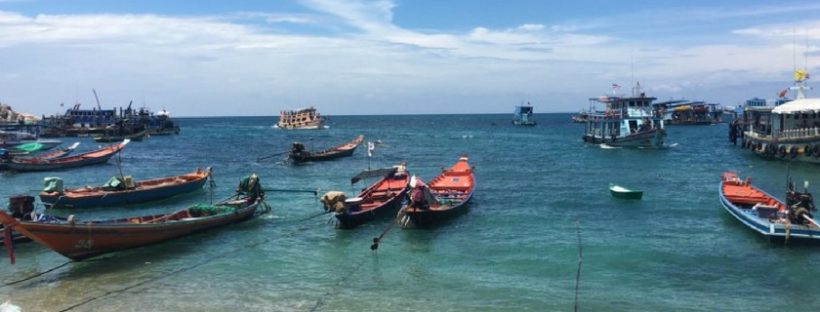

 Deb Linehan is a life coach at the New Life Foundation, a mindfulness-based recovery program in Chiang Rai, Thailand, which is a 3-hour bus ride north of Chiang Mai.
Deb Linehan is a life coach at the New Life Foundation, a mindfulness-based recovery program in Chiang Rai, Thailand, which is a 3-hour bus ride north of Chiang Mai.
 It’s beautiful here, very rural, with gardens and sustainable agriculture. It’s quiet, with butterflies and ducks and cows and lakes. We eat a lot of the food we grow here.
It’s beautiful here, very rural, with gardens and sustainable agriculture. It’s quiet, with butterflies and ducks and cows and lakes. We eat a lot of the food we grow here. I’ve learned to live on what’s there. Back home I was so much more of a consumer. I really leaned into the consumer thing whenever I had discomfort. So it’s helped my practice to be with discomfort and my feelings when they arrive, rather than trying to run away from them by buying something new.
I’ve learned to live on what’s there. Back home I was so much more of a consumer. I really leaned into the consumer thing whenever I had discomfort. So it’s helped my practice to be with discomfort and my feelings when they arrive, rather than trying to run away from them by buying something new.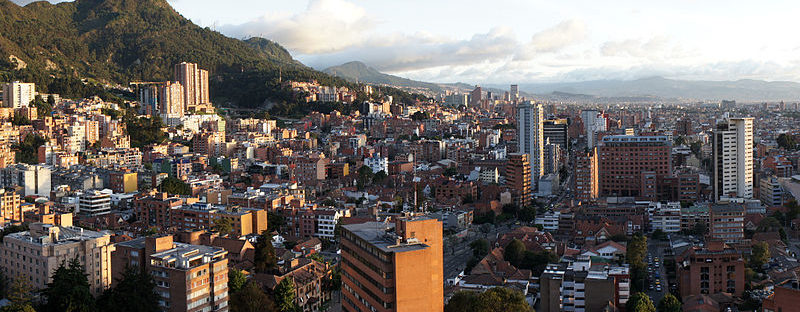
 What’s your daily life like?
What’s your daily life like? When I’m in the States, I have a lot of social connections and social anchors. What’s missing for me now is the soul connection. Here, I don’t have that go-to person to call up and say, “Hey let’s go out dancing!”
When I’m in the States, I have a lot of social connections and social anchors. What’s missing for me now is the soul connection. Here, I don’t have that go-to person to call up and say, “Hey let’s go out dancing!”
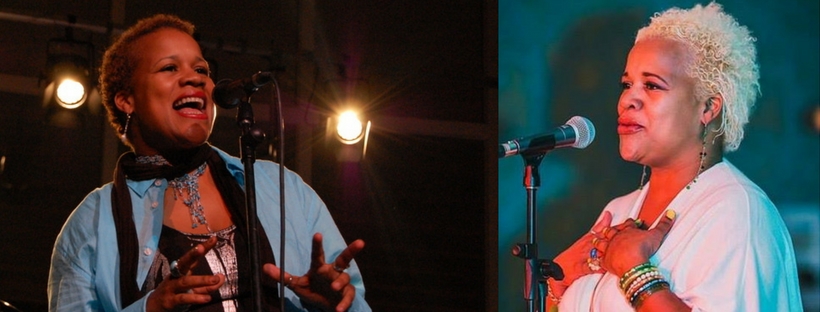
 When I told him, my older brother said, “Okay, but what’s your plan B?” I said, “My plan B is to work plan A!” I don’t have a plan B because I’m not going to fail. I fall all the time but I get up again.
When I told him, my older brother said, “Okay, but what’s your plan B?” I said, “My plan B is to work plan A!” I don’t have a plan B because I’m not going to fail. I fall all the time but I get up again. In Barcelona, I was looking for clubs to take me in, but I couldn’t find the vibe for me. So I thought, well maybe I should sing on the street like I saw so many other people doing. My perception of street musicians was that it’s not a real musician; it’s just someone who needs money. But I learned that that is so not true. I met so many people who were using the street for different purposes, to hone their craft.
In Barcelona, I was looking for clubs to take me in, but I couldn’t find the vibe for me. So I thought, well maybe I should sing on the street like I saw so many other people doing. My perception of street musicians was that it’s not a real musician; it’s just someone who needs money. But I learned that that is so not true. I met so many people who were using the street for different purposes, to hone their craft.